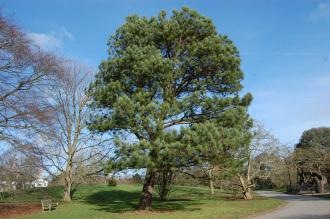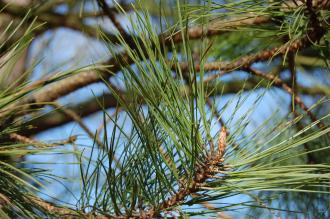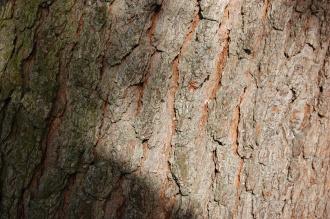
Pinus taeda (08/02/2015, Kew Gardens, London)
Position: Full sun to light shade
Flowering period: Early spring
Soil: Moist, well drained
Eventual Height: 35m
Eventual Spread: 20m
Hardiness: 7a, 7b, 8a, 8b, 9a, 9b
Family: Pinaceae
Pinus taeda is a fast growing evergreen coniferous tree with a conical habit. Its mid green leaves are in the form of needles, appear in groups of three, up to 22cm long. Its trunk may achieve a diameter of up to 1.5m. Its gray to red/ brown bark is shallowly fissured and furrowed. Its male monoecious flowers are in the form of cylindrical pollen cones. Its fruit are ovoid cones, initially green maturing to brown, up to 13cm long and 6cm across when mature.

Pinus taeda Leaf (08/02/2015, Kew Gardens, London)
Pinus taeda, commonly known as Loblolly Pine, Arkansas Pine or Southern Yellow Pine, is native to south east USA. In its native habitat it grows in lowlands and swampy areas in mixed forests.
The etymological root of the binomial name Pinus is the old classical name for ‘Pine tree’. Taeda is an ancient name for resinous Pine trees.
The landscape architect may find Pinus taeda useful as a large specimen coniferous tree suitable for poorly drained soils.

Pinus taeda Bark (08/02/2015, Kew Gardens, London)
Ecologically, Pinus taeda the seeds of this tree are attractive to some birds.
Pinus taeda prefers moist, well drained soils. It tolerates most pH of soil.
Pinus taeda requires little maintenance.

